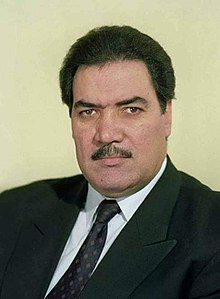

Central Committee of the People's Democratic Party of Afghanistan
6 August 1947 Gardez, Afghanistan
27 September 1996(1996-09-27) (49) Kabul, Afghanistan
4 May 1986 – 16 April 1992
President of Afghanistan Mohammad Najibullahمحمد نجیبالله Najibullah in 1991General Secretary of the Central Committee of the People's Democratic Party of AfghanistanIn office 4 May 1986 – 16 April 1992Preceded by Babrak KarmalSucceeded by Position abolished2nd President of AfghanistanIn office 30 September 1987 – 16 April 1992Prime Minister Sultan Ali Keshtmand Mohammad Hasan Sharq Fazal Haq KhaliqyarVice President Abdul Rahim Hatif Mohammed Rafie Abdul Hamid Mohtat Abdul Wahed Sorabi Sultan Ali Keshtmand Mohammed Eshaq TokhiPreceded by Mohammed Daoud KhanSucceeded by Abdul Rahim Hatif (acting)Director of the State Intelligence AgencyIn office 11 January 1980 – 21 November 1985LeaderBabrak Karmal (as General Secretary)Preceded by Assadullah SarwariSucceeded by Ghulam Faruq Yaqubi Personal detailsBorn6 August 1947 Gardez, AfghanistanDied27 September 1996(1996-09-27) (aged 49) Kabul, AfghanistanCause of deathAggravated Murder by Hanging under Extrajudicial Execution by TalibansResting placeGardez, Paktia, AfghanistanPolitical partyPeople's Democratic Party of Afghanistan (Parcham)Spouse(s)Fatana NajibChildrenHeela Najibullah Moska Najibullah Fatana NajibullahAlma materKabul University St. Joseph's School, Baramulla, Jammu and KashmirMilitary serviceAllegiance AfghanistanBranch/serviceAfghan National ArmyYears of service1965–1992RankGeneralBattles/wars Soviet–Afghan War Afghan Civil War (1989–1992) Mohammad Najibullah Ahmadzai (Pashto/Dari: محمد نجیبالله احمدزی ; 6 August 1947 – 27 September 1996), commonly known as Najibullah or Dr. Najib, was an Afghan politician who served as the General Secretary of the People's Democratic Party of Afghanistan, the leader of one-party ruling Democratic Republic of Afghanistan from 1986 to 1992 and as well as the President of Afghanistan from 1987 until his resignation in April 1992, shortly after which the mujahideen took over Kabul. After a failed attempt to flee to India, Najibullah remained in Kabul. He lived in the United Nations headquarters until his death at the hands of the Taliban after their capture of the city. A graduate of Kabul University, Najibullah held different careers under the People's Democratic Party of Afghanistan (PDPA). Following the Saur Revolution and the establishment of the Democratic Republic of Afghanistan, Najibullah was a low profile bureaucrat: he was sent into exile as Ambassador to Iran during Hafizullah Amin's rise to power. He returned to Afghanistan following the Soviet intervention which toppled Amin's rule and placed Babrak Karmal as head of state, party and government. During Karmal's rule, Najibullah became head of the KHAD, the Afghan equivalent of the Soviet KGB. He was a member of the Parcham faction led by Karmal. During Najibullah's tenure as KHAD head, it became one of the most brutally efficient governmental organs. Because of this, he gained the attention of several leading Soviet officials, such as Yuri Andropov, Dmitriy Ustinov and Boris Ponomarev. In 1981, Najibullah was appointed to the PDPA Politburo. In 1985 Najibullah stepped down as state security minister to focus on PDPA politics; he had been appointed to the PDPA Secretariat. Soviet General Secretary Mikhail Gorbachev, also the last Soviet leader, was able to get Karmal to step down as PDPA General Secretary in 1986, and replace him with Najibullah. For a number of months Najibullah was locked in a power struggle against Karmal, who still retained his post of Chairman of the Revolutionary Council. Najibullah accused Karmal of trying to wreck his policy of National Reconciliation, which were a series of efforts by Najibullah to end the conflict. During his tenure as leader of Afghanistan, the Soviets began their withdrawal, and from 1989 until 1992, his government tried to solve the ongoing civil war without Soviet troops on the ground. While direct Soviet assistance ended with the withdrawal, the Soviet Union still supported Najibullah with economic and military aid, while Pakistan and the United States continued their support for the mujahideen. Throughout his tenure, he tried to build support for his government via the National Reconciliation reforms by distancing from socialism in favor of Afghan nationalism, abolishing the one-party state and letting non-communists join the government. He remained open to dialogue with the mujahideen and other groups, made Islam an official religion, and invited exiled businessmen back to re-take their properties. In the 1990 constitution all references to communism were removed and Islam became the state religion. For various reasons such changes did not win Najibullah any significant support. Following the August Coup in Moscow and the dissolution of the Soviet Union in December 1991, Najibullah was left without foreign aid. This, coupled with the internal collapse of his government (following the defection of general Abdul Rashid Dostum), led to his resignation in April 1992. In 2017 the pro-Najibist Watan Party was created as a continuation of Najibullah's party.

We use cookies
We use cookies and other tracking technologies to improve your browsing experience on our website, to show you personalized content and targeted ads, to analyze our website traffic, and to understand where our visitors are coming from. Privacy Policy.